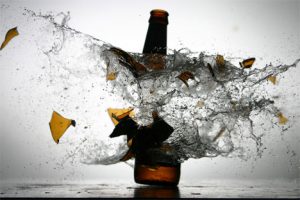
Every man who’s battled alcohol addiction will have to deal with people who confuse the desire to drink with proof of masculinity.
This, despite the fact that alcohol lowers testosterone levels, impairs recovery from workouts, dulls male sexual performance, and sometimes even turns grown men into crybabies in public.
Unless you hide from the world and shun weddings and events forever, you’ll have to figure out how to turn down a drink from another man without looking weak, angry or embarrassed.
“Have a beer…This one is yours, take it!”
If you’re not prepared for this situation, you’ll look like a deer in the headlights. “Uh, I’d love to have a beer with you, but I can’t, unfortunately.” This kind of vague, cowardly response derails your self-talk and invites more uncomfortable questions.
When you’re offered a drink, smile confidently and make unflinching eye contact. Think about how trivial this situation is in light of your broader mission in life, what nature or God intended you for. Project silent strength and cool confidence, and add a dash of frivolous humor if it springs to mind.
Here are some lines I’ve used successfully (and 95% of the time, I get nothing but a head nod and “okay” in response):
- In response to a stranger: “I’ve had enough.” This is always true, although in a longer term sense than the person suspects.
- In response to someone buying shots: “I only shoot hot sauce.” I said this to a former college classmate at a wedding. He laughed, called me a savage, and offered the shot to someone else.
- In response to someone I really do like, but haven’t seen in awhile: “It is really great to see you. I don’t drink anymore, but let’s hit the gym next week.”
If someone presses further, the most I’ll say is, “I used to drink too much, so I quit. It’s definitely for the best.” This line implies that you’re a problem solver, and not a pushover. The last time I told someone this, it was to an old friend I’d reconnected with. He said, “Man, I could never do that…I went a month once…That takes some balls.” He arched his eyebrows and I could see that the had tears in his eyes.
Whatever I say, I never tell a stranger that I’m an “alcoholic.”
You may as well call yourself a clinical couch potato. People envision bums under bridges when they hear “addict” and “alcoholic,” and they will assume that you lack the willpower to be normal. And since willpower implies choice, they will hold you accountable for it and tease you. “Just have one shot, it’s really not that hard. Don’t you have any willpower?”
As we know, addiction is a mis-wiring of the brain. It has very little to do with willpower.
If I lacked willpower, I wouldn’t have gotten into shape. Being fit requires a lot of willpower and it’s obvious who’s fit and who isn’t.
Getting as fit as possible was part of my strategy to transcend addiction from the very beginning.
The social benefits are secondary to the inner virtues you’ll develop as you achieve physical strength. But they are just as real. If a blatant slob thinks I can’t drink because I lack willpower, he’s going to have to reconcile that with the fact that I have the willpower to stay in shape and he doesn’t.
Being physically weak isn’t conducive to the confidence you’ll need to turn down drinks for the rest of your life and feel good about it. The solution is to make weakness, in all of its forms, a part of your past.
When I was actively drinking, I avoided events and always ended up drinking at home. I was technically strong, but not nearly as strong as I am today, and I wasn’t at all fit.
When I quit drinking, I got up off the couch, hit the gym, and started eating better food. I read books, like Unlimited Power by Tony Robbins, that helped me dissolve the mental paradigms that trapped me in a vicious cycle of fear. Once you decide to recover, these self-initiated actions are a matter of willpower. And you have the power to take them.
Author
-
Chris Scott founded Fit Recovery in 2014 to help people from around the world dominate alcohol dependence and rebuild their lives from scratch. A former investment banker, he recovered from alcohol dependence using cutting-edge methods that integrate nutrition, physiology, and behavioral change. Today, Chris is an Alcohol Recovery Coach with dozens of private clients, the author of a short book called Drinking Sucks!, and the creator of an online course called Total Alcohol Recovery 2.0.
View all posts





